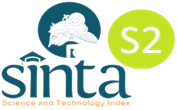KORELASI ANTARA KETERAMPILAN METAKOGNITIF DENGAN HASIL BELAJAR BIOLOGI SISWA SMP NEGERI KUPANG
DOI:
https://doi.org/10.33477/bs.v4i1.528Abstract
Penelitian ini bertujuan untuk mengetahui hubungan antara keterampilan dan dengan hasil belajar biologi siswa SMP negeri di kota Kupang. Penelitian ini adalah penelitian deskripitif dengan metode pengambilan sampel secara survey pada siswa SMP Negeri di Kota Kupang. Pengambilan sampel dilakukan secara acak. Sampel penelitian adalah SMP Negeri 1, 3, dan 4. Data keterampilan metakognitif diperoleh melalui tes essay yang terintegrasi dengan keterampilan metakognitif. Hasil belajar biologi diperoleh langsung dari sekolah sampel. Data yang diperoleh dianalisis dengan statistik inferensial. Hasil penelitian diperoleh bahwa ada korelasi antara keterampilan metakognitif dengan hasil belajar biologi siswa SMP di Kota Kupang. Kata kunci: keterampilan metakognitif, hasil belajar biologiReferences
Anderson, I.W. & Krathwohl, D. R. 2001. A Taxonomy for Learning, Teaching and Assessing: A Review of Bloom’s Taxonomy of Educational Objective. United State: Addison Wesley Longman, Inc.
Corebima, A. D. 2008. Rubrik Keterampilan Metakognisi yang Terintegrasi dengan Tes Essay, Rubrik MAD. Malang.
Corebima, A. D. 2009. Jadikan Peserta Didik Pebelajar Mandiri. Makalah. Disampaikan pada seminar di UNM pada tanggal 19 Desember 2009.
Corebima, A. D. 2010. Berdayakan Keterampilan Selama Pembelajaran Sains Demi Masa Depan Kita Makalah. Disampaikan pada seminar Nasional Sains di Uiversitas Negeri Surabaya pada tanggal 16 Januari 2010.
Dasoete, A. 2001. Off-line Metacognition in Children with Mathematics Learning Disabilities Faculteid Psychologies en Pedagogiche Wetens Chapens. Universited – Gent.
(http://acchieve.ugnet.be/retrievel/917/801001505476.pdf, diakses tanggal 22 September 2013.
Djiwandono, S. E.W., 2006. Psikologi Pendidikan. Jakarta: Gramedia.
Livingston, J.A. 1997. Metacognition: An Overview. Online), (http://www.gse. bufallo.edu./fas/shuell/cep564/metacog.htm.diakses 23 jul 2013)
Malone, K.I. 2008. Correlation among Knowledge Structure, Force Concept Inventory and Problem Solving Ability. Physics Education Research. (online) 4 (2):1–15 (http//www.prstper.aps.orgpdfPRSTPERv4i2e020107) . Diakses 23 September 2013.
Mesaros, P.,M. Mesarosova., L. Mesarosova. 2012. Learning to Learn Competency, Metacognitive Learning Strategies and Academic Self Concept of University Students. International Journal of Arts and Sciences. CD – ROM. ISSN: 1944 – 6934: (Online) 5(2) 489-497.. Diakses 13 September 2013. (http://www.gse. Bufallo.edu./fas/shuell/cep564/ learning.htm.
Miranda, Yula. 2010. Dampak Pembelajaran Metakognitif dengan Strategi Koperatif terhadap Kemampuan Metakognitif Siswa dana Mata Pelajaran Biologi di SMA Palangka Raya. Jurnal Penelitian Kependidikan. No 2. Oktober 2010.
Nur, Muhammad. 2004. Teori-teori Perkembangan Kognitif. Edisi 2. Surabaya: Universitas Negeri Surabaya.
O’Neil Jr, H.F., and Brown, R.S. 1997. Differential Effects of question Formats in Math assesment on Metacognition and Affect. Los Angeles: CRESST-CSE University of California.
Pintrich, P.R. 2002. The Role of Metacognitive Knowledge in Learning, Teaching and Assessing. Teori into Practice. (Online) 41 (4): 219-225 (http//www.each.usp.brcmappingpdfedmxta10.pdf). Diakses 23 September 2013.
Purwanto, G. 2007. Psikologi Pendidikan. Bandung: PT Rosda Karya.
Scraw, G., & Dennison, R.S. 1994. Assessing Metacognitve Awareness. Contemporary Educational Psychology, 19. 460 – 475.
Weiner, F. E & Kluwe, R. H. 1978. Metacognition, Motivation and Understanding. Hillsdale. New Jersey: Lawrence Erlbaum Associates Publishers.
Winkel, W.S. 1997. Psikologi Pendidikan dan Evaluasi Belajar. Jakarta: Gramedia.
Downloads
Published
Issue
Section
License
Authors who publish with this journal agree to the following terms: Authors retain copyright and grant the journal right of first publication with the work simultaneously licensed under a Creative Commons Attribution License that allows others to share the work with an acknowledgement of the work's authorship and initial publication in this journal. Authors are able to enter into separate, additional contractual arrangements for the non-exclusive distribution of the journal's published version of the work (e.g., post it to an institutional repository or publish it in a book), with an acknowledgement of its initial publication in this journal. Authors are permitted and encouraged to post their work online (e.g., in institutional repositories or on their website) prior to and during the submission process, as it can lead to productive exchanges, as well as earlier and greater citation of published work.














